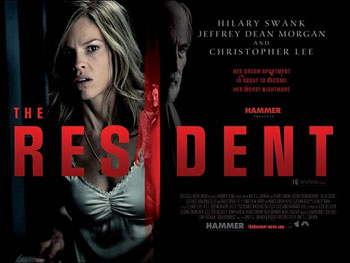The Resident ***
 If you live alone this film is targeting you, playing on that feeling of foreboding you might experience when things go bump in the night, or the landlord gets a bit too familiar. In addition to the celebrated return of the Hammer Films with this film, The Resident also rejoices in the idea of creepy old buildings, full of history, with an unexplained presence ever watching, brought up to date with modern society’s obsession with CCTV. Debut feature writer/director Antti Jokinen attempts to prey on our senses with a disquieting ease, using voyeuristic Hitchcockian crafts to deliver a film-noir style with sinister shadows, creaking interiors and mysterious, cavernous old walls.
If you live alone this film is targeting you, playing on that feeling of foreboding you might experience when things go bump in the night, or the landlord gets a bit too familiar. In addition to the celebrated return of the Hammer Films with this film, The Resident also rejoices in the idea of creepy old buildings, full of history, with an unexplained presence ever watching, brought up to date with modern society’s obsession with CCTV. Debut feature writer/director Antti Jokinen attempts to prey on our senses with a disquieting ease, using voyeuristic Hitchcockian crafts to deliver a film-noir style with sinister shadows, creaking interiors and mysterious, cavernous old walls.
The story follows young Brooklyn surgeon Juliet (Hilary Swank) who is getting over a messy break-up with her husband, Jack (Lee Pace), and decides to move into a new apartment. She cannot believe her luck when she discovers a character-filled loft with stunning views of the river that’s going cheap – plus its handsome landlord, Max (Jeffrey Dean Morgan), is incredibly supportive, generous and sensitive, too. Things begin to quickly sour, though, after the pair have a brief and intimate moment, and Max begins to form a frightening obsession with her, made worse by Jack coming back into Juliet’s life.
The Resident is a beautifully shot character-driven piece that attempts to break the horror mould by concentrating on the leads’ psychological battles, using endless point-of-view shots, rather than blatant terror thrills. Admittedly, the surprise element of who/what the evil is is known from the start. So, it’s just a question of waiting to see how and when Dean Morgan’s character, Max, spirals out of control. This makes some of voyeuristic shots of someone watching Max and Juliet together fairly redundant, even as red herrings. There is the standard fear of what’s on the other side of the mirror that’s carried throughout the film with good effect, even if it’s been done to death in the past.
The film has a nice pace to it as it tries to flesh out a believable relationship between Juliet and Max, taking Max out of the environment that he controls, at times. But it does feel like there are large plot holes, especially towards the end with Jack’s character, as though Jokinen is concerned about the audience’s attention span, and some premature editing has been employed to get it around the 90-minute mark. In terms of aiming for the psychological aspect, too, the film still falls back on the standard, dramatic chords to signify the frights that render it amusing and very formulaic; homage to Hammer, perhaps, or just designed to highlight the obvious?
The casting is a mixed bag, although we fully respect Jokinen’s aim to make Max as realistic a person as possible, and not turn him into a caricature. Swank provides her usual strong female lead, commendably carrying us through her story and Juliet’s post-break-up pain and subsequent chilling nightmare. She is suitably cast. But there does seem to be a certain lack of really credible vulnerability to her method sometimes, even after she finds out some shocking truths from the recorded CCTV footage in her flat.
Dean Morgan has all the sweet shyness and puppy-dog vulnerability to lure us into a false sense of security, but he doesn’t fully convince as a psychopath, as well as we might have hoped for. Indeed, as a female who should be appalled by Max’s malevolent methods in this, he still doesn’t put the fear of God into you at end. Dean Morgan is simply big-screen ‘hunky hero’ material by nature, hence trying to see him in another light is nigh impossible. However, it posed an interesting experiment by Jokinen and co-producer Swank to cast Dean Morgan in the role, and he does admirable attempt at keeping a balance on the difficult portrayal of a mentally ill person, without over-cooking it. Back to the lack of plot, though, there needs to be more explanation into Max’s background to get a clearer picture of where his insecurities lie? Just when you think Hammer icon Christopher Lee’s character August, Max’s grandfather, will provide this, this avenue is abruptly closed off, leaving more questions than answers.
The Resident serves as a worthy feature-film debut for Antti Jokinen, with plenty of ‘suggestive’ parts that are far more effective and disturbing than the action being played out. Perhaps, with more suggestion to allow the viewer’s mind to wander, the film could have outsmarted others in the genre, rather than resorting to type in places. Also, less is not necessarily more – as in the case of Max, with further insight needed to fully understand his torment. For The Resident to truly work, we need to empathise with both leads for their tragic dynamic to pay off.
3/5 stars
By @FilmGazer